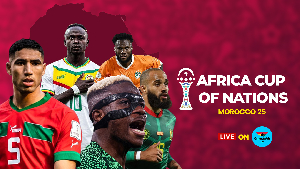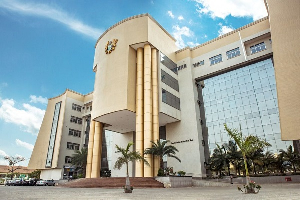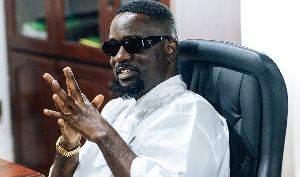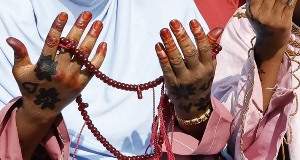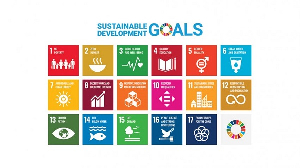By Dr. Michael J.K. Bokor
E-mail: mjbokor@yahoo.com
Monday, August 8, 2011
It is imperative that we don’t fail to scrutinize the character traits of those seeking leadership positions in our country. We do so at our own risk because if we allow our political interests to cloud our judgement and just accept them on the surface and install them in office, they will not provide the impetus that we need to move our country forward.
I say so with a guarded impression, created by the current barrage of criticisms being levelled against President Mills’ leadership style. Indeed, no day passes by without someone openly condemning him for not living up to expectation. Some even perceive him as weak, incompetent, malleable, unfocused, timid, and not in control of his government. These are serious allegations that in one way or the other may also account for the internal problems facing the NDC. Invariably, it is the country and its citizens that suffer!
In fact, if the verdict of such critics is anything to go by, it will mean one thing: that the NDC has already lost the 2012 general elections. The question, then, arises as to whether the inadequacies that people have now identified in him—and for which they see him as a “one-term President”—hadn’t long been in his character long before he became the President. As Vice President under Rawlings, did he have those very qualities? Why did he not exhibit those inadequacies? Or was it that those traits were visible but Ghanaians failed to see them and now have themselves to blame for electing him as the President to perform abysmally, as his critics will have us believe?
Or within the context of the tongue-lashing going on now against him, can we say that if Ghanaians had probed more pin-pointedly into his leadership or character streaks, they wouldn’t have given him their mandate? Or that in hindsight, many voters have regretted for rashly putting him in office, apparently because they failed to probe more deeply into his leadership skills before giving him the long rope with which he is now being accused of strangling them?
Or that they haven’t learnt the lesson of subjecting future high office seekers to vigorous scrutiny before entrusting their destiny into his hands? Or that they will be so mindless as to commit the same blunder only to sit back, curse their star, and grind their teeth in a belated show of anguish and in readiness to kick him out office at the next polls? Or that they will allow the vicious cycle of putting political chameleons in office to continue running its full course to keep the country perpetually in the quagmire?
These are the overarching issues that arise from any attempt to question the character traits of any politician aspiring to become Ghana’s President. By virtue of where he is now, the NPP’s Akufo-Addo exposes himself to that scrutiny and no one should attempt cowing anybody into submission just because of the NPP functionaries’ avowed aim to undo the incumbent.
In writing to excite open discussion of one of the major problems that puzzle Ghanaians about high office seekers, I appear to have made myself the bull’s eye for the NPP’s archers who have hurled insults at me and threatened to bring down hellfire and brimstone to consume me.
Unfortunately, these NPP buffs think that I am out purposely to tarnish Akufo-Addo’s image as part of the NDC’s propaganda. Let me tell them that they can’t browbeat me into abandoning what I have chosen to do, which is to throw the searchlight on their Presidential Candidate so as to bring out what in him will not redound to his leadership ambitions in his spiraling quest for the highest office of the land. I must tell them aboveboard here that those of us raising issues with a bearing on Akufo-Addo’s character streaks are not their problem to solve.
But because they can’t separate what we raise to probe into his character from what to do to solve his credibility problems, they quickly turn round to see us as their problem. For as long as they do so and construct us as nails, they continue to use a hammer (insults and empty threats) as their only tool to solve a non-existent problem instead of focusing on the real one that affects their Presidential Candidate and finding the appropriate means to enhance his image.
Of course, questioning the character traits of Ghanaian public officials is nothing new in Ghanaian politics. Asking that Akufo-Addo come clean on what perturbs us and raises question marks on his character shouldn’t be misconstrued as an act of mischief. The allegation of drug use on its own is nothing strange because it has been in the public domain long before he even reared his head to look for the highest office of the land. It is moot but has remained topical because of the larger-level issues that it raises.
Maybe, the NPP functionaries are still not clear about what caused his defeat in the 2008 Presidential run-off or they are in an indecent haste to brush that painful memory under the rug to market him aggressively for the 2012 elections, firmly believing that the odds will favour him this time. Elections are not won that way. Yesterday’s Akufo-Addo remains today’s Akufo-Addo.
The question that they need to address is simple: Why did he win the first round of the election but lost the run-off? If Arthur Kennedy’s self-introspective book (Chasing the Elephant into the Bush) hasn’t provided the answers to help them face reality, they need to look far afield. They will realize, then, that one of the major problems that worked against him was the public apprehension that his character wasn’t assuring. Many viewpoints suggested that clouds hung over his reputation, apparently because his political posturing itself added more fuel to the poor opinions about him. I say so with confidence that a dispassionate inquiry by any of the NPP followers will not say otherwise.
If that major problem is not addressed, no matter what the NPP does, it will hit the brick-wall again. I think that the electorate will want to be assured that what they perceived in 2008 about him and what he is presenting today (or will demonstrate between now and just before the elections) will be far different from what informed their electoral decision against him in 2008. That’s the nub of all that I’ve been driving at.
Calling attention to that issue—and using the persistent allegation of drug use as the most obvious one—is not a challenge to battle. I am doing my duty as a Ghanaian who is concerned about the leadership crisis that has dogged the country all these years and who expects that those who find fault with the incumbent will not themselves enter office to do worse. I am guided by historical precedent to suggest that there is nothing wrong with asking that Akufo-Addo should come clean on the particular allegation that has refused to die despite all the damage control going on.
How many Ghanaians won’t quickly say that the late Acheampong’s incontinence (especially the “Fa wo to begye Golf” syndrome) was the catalyst for the “Kalabule” (massive moral degeneration, economic stagnation) and political jingoism (“Union Government”) that characterized his administration? Or that his drinking problem adversely affected his handling of government business? Of course, no one voted him into office, but his character became a major cause of our national doom.
Again, how many opponents of Rawlings haven’t attributed his alleged “explosive” nature and tendency to be physical (assaulting Kow Nkensen Arkaah, former Vice President, for instance) to his being a “wee” smoker (meaning that his decisions and actions were influenced by the effects of the substance)? Or, how many haven’t rationalized their perception of whatever they blame in President Mills with something related to his character (as they would want us to believe)?
So, why should anybody not want me to suggest that the streaks of Akufo-Addo’s character be scrutinized too? Why, then, will the NPP activists impudently assassinate others’ character but rush out—teeth and claws drawn—to tear into shreds those putting their sacred cow on the spot to answer questions pertaining to a character trait? Why are they aggressively defending him and threatening hellfire and brimstone to prevent us from knowing more about him beyond the superficial angelic persona that his political posturing portrays?
If scrutinizing high office seekers’ character will help us separate the goats from the sheep, that’s what we must do to prevent the square pegs from filling the round holes. Some NPP functionaries are unhappy that their Presidential Candidate should be put on the spot and wonder whether I don’t see the numerous serious national problems to write on. They make me wonder in turn whether they don’t know what they are setting out for in supporting their sacred cow to seek the mandate of the people to lead them.
Yes, I know that we have serious national issues such as the stunted growth of the economy vis-à-vis the rising cost of living to write on. But towering above these issues is the real problem, which is lack of leadership to help solve all these problems. That’s where I have my edge over those NPP loud-mouths!
To me, focusing attention on the calibre of those seeking to replace the incumbent President Mills and his NDC government is not out-of-place because it raises important issues to be interrogated. Many Ghanaians will bear me out that one of the major problems hindering our country’s growth and development is leadership crisis. If there is anything bothering Ghanaians, which has dominated public discourse for many years now, it is this very crisis of leadership, which seems to be creating conditions for despondency or desperation—if not outright hopelessness—among the people (those residing in the country or living abroad and “killing” themselves for the good of other systems).
Considering the singular laudable accomplishments of individual Ghanaians in many fields of human endeavour, the troubling question arises why our country can’t get the requisite leadership to take off, some 54 years after independence. What is it about other systems that makes it possible for Ghanaians to excel therein but not back home when they get into political office? What was it about the United Nations, for instance, that made the Ghanaian Kofi Annan perform creditably therein to the admiration of the world to have his second term unanimously renewed? Could he have excelled managing Ghana too?
Or what is it about our country that prevents it from getting the kind of leadership that countries in the same (under)development bracket with it had but outgrew to become showcases of rapid development while Ghana is still toddling? I have in mind South Korea, Singapore, Malaysia, among others. Such countries didn’t achieve rapid development because they knew how to fly off with wings developed overnight.
They did so because they had leaders with the requisite vision backed by a reliably effectual acumen to galvanize their people into taking their own (and their countries’) destiny into their own hands. In Ghana, the exact opposite is the norm; and that is why despite the overabundance of natural and human resources, the country takes one step forward and ten back in retrogression.
It is against this background that anybody who seeks the people’s mandate to become the President (and leader of government) must be thoroughly assessed at all levels to ensure that he is not entering office with dubious streaks of character to compound our problems. In Akufo-Addo’s case, the allegation of drug use is just the tip of the iceberg. And once we know that behind the mask is the real man, we have every opportunity to ask questions raised by lingering doubts, and it’s up to him to persuade us that he is the kind of leader that Ghana needs.
More importantly, the electorate want to be assured that he has new things up his sleeves to make the difference between him and all others who have so far failed to solve our national problems. They don’t want to be bothered by empty bragging concerning human rights and a successful law practice. As is evident already on his “listening” tour, he may be confronted with revelations of more problems facing the people than he will have the solution for. But knowing m as a typical example of the promise-making Ghanaian politician seeking to cash in on the poor people’s plight, he will definitely promise them everything, including the moon.
Such a politician portends more doom for the country. Let’s be bold to question what we are not comfortable with so that those we elect into office will not turn out to be problems for us to solve. We need problem solvers instead to help us move the country forward. The conversation continues.
Opinions of Tuesday, 9 August 2011
Columnist: Bokor, Michael J. K.


